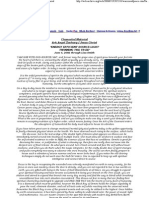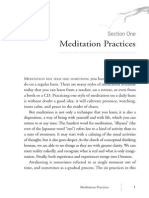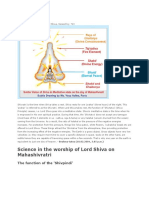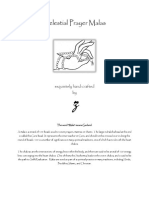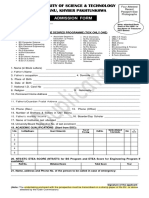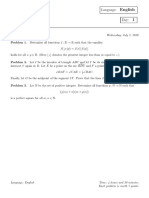Conventional Symbols in Literature: 1 Symbolism Mr. Rose
Conventional Symbols in Literature: 1 Symbolism Mr. Rose
Uploaded by
critestachCopyright:
Available Formats
Conventional Symbols in Literature: 1 Symbolism Mr. Rose
Conventional Symbols in Literature: 1 Symbolism Mr. Rose
Uploaded by
critestachOriginal Title
Copyright
Available Formats
Share this document
Did you find this document useful?
Is this content inappropriate?
Copyright:
Available Formats
Conventional Symbols in Literature: 1 Symbolism Mr. Rose
Conventional Symbols in Literature: 1 Symbolism Mr. Rose
Uploaded by
critestachCopyright:
Available Formats
Conventional Symbols in Literature
A symbol is a setting, object, character, or event in a story that carries more than the literal meaning and
therefore represents something significant to understanding the meaning of a work of literature. In other
words symbols always have a literal (concrete) meaning and a figurative (abstract) meaning. Conventional
symbols have a previously agreed upon meaning. Example:
SERPENT
Literal meaning: A serpent is a slithering reptile that hisses
Symbolic meaning: the devil, especially the devil’s aspect of deceit and deception
Conventional source: Genesis, the Garden of Eden
Some conventional symbols are as follows:
COLORS
Red: blood, passion, emotion, danger, or daring Pink : innocence, femininity
Black: passivity, death, evil Purple : royalty
White: innocence, purity, light Brown : earth, soil, humility and poverty
Green: new life, fertility, hope Orange : heat, sun
Yellow: caution, decay, decrepitude, old age Gold: riches, sacredness
Blue: peace, serenity, eternity
NATURE
Spring: birth, new beginning Light: truth, safety, warmth, knowledge
Summer: maturity, knowledge Darkness: evil, ignorance, danger
Autumn: decline, nearing death, growing old Apple: temptation, loss of innocence
Winter: death, sleep, hibernation, or stagnation Weeds : evil, wildness/outcasts of society
Christmas season: birth, change for the better Flowers: beauty, youth, strength, gentleness
Easter season: rebirth, enlightenment Rose: budding youth, romance
Dawn: illumination, hope Water: purification, cleansing
Evergreen tree: immortality
WEATHER
Fog/Mist: isolation; confusion, obscurity Morning : purity and promise
Rain: sadness or despair Rainbows : heralds of good fortune, heaven
Wind and storms: violent human emotions Thunder : God’s wrath, punishment
Lightning : power and strength
ANIMALS
Dove : peace, purity, simplicity Hawk : sharp, keen eyesight
Fox: slyness, cleverness Owl : wisdom
Raven: death, destruction, impending doom Cats : cunning, forethought, and ingenuity
Lion: strength, power, authority Lamb : sacrifice element, the children of God
Peacock: pride, vanity Eagle: freedom
Mouse : shyness, meekness Donkey: humility, patience, stupidity
Buzzard/Vulture: warning of impending death
CLOTHING
Cape: withdrawal into oneself or into God. Mask: demonic tendencies
Cloak: human trickery
1 Symbolism Mr. Rose
SETTINGS
Forest: usually a place of evil or mystery Window: freedom or lack thereof
Desert: isolation: alienation, loneliness Door: opportunity
Garden: paradise of a haven Park: a place for retreat and renewal
OBJECTS
Skull: death Candle: light in the darkness
Crown: wealth Circle: wholeness, perfection
Ring: long-term commitment Fire: Hell; pain, death
Axe: battle, work Pearl: incorruptibility
Belt: protection, chastity Sword: protection, strength
ACTIONS
Kiss: friendship, fellowship, intimacy Journey: the call of fate, adventure
NUMBERS
Zero (0): the ultimate mystery; nothingness
Three (3): tripartite nature of the world; signifies fulfillment
Consider: Holy Trinity; 3: beginning, middle, end; past, present, and future;
Five (5): human perfection
Consider: Five senses, five fingers on each hand, five toes on each foot, five wounds of Jesus
Seven (7): totality; divine abundance
Consider: Seven days of creation, seven days of the week, seven sacraments, seven deadly sins
Twelve (12) universal fulfillment
Consider: Twelve tribes of Israel, Twelve Apostles, twelve days of Christmas, 12 months in a year
Forty (40): penance, purification
Consider: 40 days of lent, Jesus spent 40 days in the wilderness, the Jews wandered the desert
for forty years, Moses spent 40 days on Mt. Sinai, the Great Flood was caused by 40 days of rain
2 Symbolism Mr. Rose
You might also like
- Free Guided Meditations Brainwave Therapy - BraDocument1 pageFree Guided Meditations Brainwave Therapy - BrasusheelsoftskillsNo ratings yet
- EclipseDocument2 pagesEclipseKalpesh ShahNo ratings yet
- TheQuimbyManuscripts 10004620Document447 pagesTheQuimbyManuscripts 10004620elielma995998No ratings yet
- Sri Mantra For WealthDocument3 pagesSri Mantra For WealthHemilton CarvalhoNo ratings yet
- The Practice of The Goddess Green TaraDocument15 pagesThe Practice of The Goddess Green Taraaudnsk100% (2)
- Shiva RatriDocument5 pagesShiva RatrisrimatsimhasaneshwarNo ratings yet
- Shi/'i in BibleDocument192 pagesShi/'i in BibleMohammad N.H. Gilani100% (7)
- Remove Obstacles For Finding Life PartnerDocument2 pagesRemove Obstacles For Finding Life PartneramazingdivinegraceNo ratings yet
- Animal Symbolism - toteMS.dream Analysis..a To ZDocument71 pagesAnimal Symbolism - toteMS.dream Analysis..a To Zbj ceszarNo ratings yet
- ReikiDocument5 pagesReikiAshutosh SharmaNo ratings yet
- Reiki Guides and AngelsDocument2 pagesReiki Guides and AngelsCrina Mihaela DaneaNo ratings yet
- Chakra Mudras PDFDocument11 pagesChakra Mudras PDFAndrea KoumarianNo ratings yet
- Forgiveness: Forgiveness and The New Group of World ServersDocument17 pagesForgiveness: Forgiveness and The New Group of World ServersMaria MastroianniNo ratings yet
- Angel of Abundance and Prosperity: ChakrasDocument3 pagesAngel of Abundance and Prosperity: ChakrasCleveland AlexanderNo ratings yet
- The SupremeDocument2 pagesThe SupremeMichael Eugene Church100% (1)
- God As A Dog - DoyleDocument13 pagesGod As A Dog - DoyleBrian Doyle-Du BreuilNo ratings yet
- Mantra Sadhana Rituals GuideDocument14 pagesMantra Sadhana Rituals GuideShrinivas Kulkarni100% (1)
- Mantras For Astral Projection 1Document2 pagesMantras For Astral Projection 1SIGILS MANIFESTATION100% (1)
- The Merkaba Meditation Restores Man To The Powers of Enlightenment and Healing in Ancient WisdomDocument2 pagesThe Merkaba Meditation Restores Man To The Powers of Enlightenment and Healing in Ancient WisdommybestselfNo ratings yet
- Folklore Studies and Ethnology in Slovenia 2: Mare Kõiva, Andres KuperjanovDocument12 pagesFolklore Studies and Ethnology in Slovenia 2: Mare Kõiva, Andres KuperjanovSlovenianStudyReferences100% (1)
- Chakra Elixirs Chakra ElixirsDocument2 pagesChakra Elixirs Chakra ElixirsAnita100% (1)
- Tantric MeaningsDocument2 pagesTantric MeaningsRazvan RakshasaNo ratings yet
- Music and Soul Awareness: The Seven-Stringed InstrumentDocument2 pagesMusic and Soul Awareness: The Seven-Stringed InstrumentStefaan Van NuffelNo ratings yet
- The Mother's SymbolDocument24 pagesThe Mother's SymbolsdoctorNo ratings yet
- Angels of The Miracles of The SpheresDocument3 pagesAngels of The Miracles of The SpheresImmalightNo ratings yet
- Duality Sexual AlchemyDocument5 pagesDuality Sexual AlchemyJoe E BandelNo ratings yet
- Agya Chakra and Your PersonalityDocument7 pagesAgya Chakra and Your PersonalityDrGarima Saxena MehtaNo ratings yet
- Solar Fire Interpretations Report Transits To Natal InterpretationsDocument14 pagesSolar Fire Interpretations Report Transits To Natal Interpretationswww_sickmandanNo ratings yet
- Soul HealingDocument2 pagesSoul HealingFerizNo ratings yet
- Aquarian Wind 4: Manifesting: Manifestation of MatterDocument2 pagesAquarian Wind 4: Manifesting: Manifestation of MatterStefaan Van NuffelNo ratings yet
- Find Your Mayan Daykeeper BelowDocument6 pagesFind Your Mayan Daykeeper BelowJenn AngNo ratings yet
- Channeled Material Ark Angel Zachary / Jesus Christ "Energy Efficient Source Light Twinning The Tr-Ee"Document5 pagesChanneled Material Ark Angel Zachary / Jesus Christ "Energy Efficient Source Light Twinning The Tr-Ee"api-3732890100% (1)
- AngelsDocument2 pagesAngelsEla2305No ratings yet
- Spring Solstice Channelling 2005Document18 pagesSpring Solstice Channelling 2005EmeraldRayNo ratings yet
- Kuthumi Attunement: Master Kuthumi: Focus, Dedication To Life Purpose, Ralaxation, CalmingDocument3 pagesKuthumi Attunement: Master Kuthumi: Focus, Dedication To Life Purpose, Ralaxation, Calmingxo8i5oxNo ratings yet
- Meditation Practices: Section OneDocument14 pagesMeditation Practices: Section OneTertBKRRRNo ratings yet
- Chinese Year AnimalsDocument4 pagesChinese Year Animalsapi-330119274No ratings yet
- E Lunar7 11Document2 pagesE Lunar7 11Stefaan Van NuffelNo ratings yet
- Angels Their Origin, Nature and Purpose: The Mission of Angelic Beings Is To Protect, Nurture and Guide HumanityDocument3 pagesAngels Their Origin, Nature and Purpose: The Mission of Angelic Beings Is To Protect, Nurture and Guide HumanitynawazNo ratings yet
- Meaning of Blue ColorDocument6 pagesMeaning of Blue ColorRubie RubioNo ratings yet
- Creating Sacred SpaceDocument1 pageCreating Sacred SpaceMayeNo ratings yet
- Science in The Worship of Lord Shiva On MahashivratriDocument8 pagesScience in The Worship of Lord Shiva On MahashivratripixelheartNo ratings yet
- Prayer PDFDocument3 pagesPrayer PDFGOVINDHARAJU PALANINo ratings yet
- The Ultimate Cheat Sheet For Crystal PairingsDocument10 pagesThe Ultimate Cheat Sheet For Crystal PairingsAmelia AbidinNo ratings yet
- Archangels and Masters An IntroductionDocument13 pagesArchangels and Masters An Introductionbprajhr3226No ratings yet
- Acred Ymbols: - Keys To Unlock Their MeaningDocument12 pagesAcred Ymbols: - Keys To Unlock Their MeaningBhuvnesh Tenguria100% (1)
- Chakras: Index PageDocument10 pagesChakras: Index PagenomiapsNo ratings yet
- Chakra SystemDocument7 pagesChakra SystemRagghu RangswamyNo ratings yet
- Karma, DNA of Our Soul: Read Complete Article BelowDocument6 pagesKarma, DNA of Our Soul: Read Complete Article BelowddhilipkumarNo ratings yet
- All About Heart ChakraDocument2 pagesAll About Heart ChakraShuvashishNo ratings yet
- Dharba and Its EffectDocument3 pagesDharba and Its EffectpavanakrishnaNo ratings yet
- Archangel Michael RosaryDocument3 pagesArchangel Michael Rosaryreikigold8232No ratings yet
- The Law of One Book 3 PDFDocument178 pagesThe Law of One Book 3 PDFMarcella ToussaintNo ratings yet
- Maakali Course 1Document2 pagesMaakali Course 1Abdul Sadiq BakshNo ratings yet
- 10 Protection Shield MeditationsDocument8 pages10 Protection Shield MeditationsSanjay Ku AgrawalNo ratings yet
- The Magic of MerlinDocument17 pagesThe Magic of MerlinJayP70100% (2)
- Mantras For Astral Projection 3Document2 pagesMantras For Astral Projection 3SIGILS MANIFESTATIONNo ratings yet
- Your Introduction To The Healing Powers ofDocument2 pagesYour Introduction To The Healing Powers ofapi-314325235100% (1)
- The Great InvocationDocument3 pagesThe Great InvocationMaxene CerezoNo ratings yet
- Conversionworksheet PDFDocument2 pagesConversionworksheet PDFcritestachNo ratings yet
- Psychiatric Social Worker 6720: General Description of ClassDocument3 pagesPsychiatric Social Worker 6720: General Description of ClasscritestachNo ratings yet
- REH984b 05a PDFDocument17 pagesREH984b 05a PDFcritestachNo ratings yet
- Instrumentation and Measurement Systems: Week 4Document34 pagesInstrumentation and Measurement Systems: Week 4critestachNo ratings yet
- MT338 Chap1 Intro To Fluid MechanicsDocument77 pagesMT338 Chap1 Intro To Fluid MechanicscritestachNo ratings yet
- Theory of Machines, MT 215: Kinematic FundamentalsDocument29 pagesTheory of Machines, MT 215: Kinematic FundamentalscritestachNo ratings yet
- Solar Tracker ProjectDocument4 pagesSolar Tracker ProjectcritestachNo ratings yet
- Bagnol PT Science 6 q3Document4 pagesBagnol PT Science 6 q3Jing Goal Merit100% (3)
- Beyond Mercy - The Lie of AbortionDocument39 pagesBeyond Mercy - The Lie of AbortionDr. A.L. and Joyce Gill100% (3)
- University of Science & Technology Bannu,: Khyber PakhtunkhwaDocument2 pagesUniversity of Science & Technology Bannu,: Khyber PakhtunkhwaAbdul Malik Kabul KhelNo ratings yet
- A Reflective Journal That Highlights The Application of A LearnerDocument2 pagesA Reflective Journal That Highlights The Application of A LearnerJessa EsperidaNo ratings yet
- 1 Project DescriptionDocument7 pages1 Project Descriptionhyde93No ratings yet
- The Theory of Sense Relation and Its Application in Reading ComprehensionDocument6 pagesThe Theory of Sense Relation and Its Application in Reading Comprehensionvhiep1988No ratings yet
- Sidebar: The Poor Woman's Lamp by Daisaku Ikeda, SGI PresidentDocument3 pagesSidebar: The Poor Woman's Lamp by Daisaku Ikeda, SGI PresidentDebanjan BanerjeeNo ratings yet
- GoligcalDocument2 pagesGoligcalPramothThangarajuNo ratings yet
- Unit 9 - 12 BinderDocument17 pagesUnit 9 - 12 BinderDimaNo ratings yet
- St. Joseph's January 22, 2012 BulletinDocument2 pagesSt. Joseph's January 22, 2012 Bulletinkristen_j_grahamNo ratings yet
- Mapping The Threshold: "A Theory of Design and Interface"Document11 pagesMapping The Threshold: "A Theory of Design and Interface"Magdalena PMNo ratings yet
- Loftus & Palmer Revision PresentationDocument18 pagesLoftus & Palmer Revision PresentationCarter PrinceNo ratings yet
- Language Teaching Through Critical Thinking and Self-AwarenessDocument9 pagesLanguage Teaching Through Critical Thinking and Self-AwarenessMiguel Alberto Anabalón TorresNo ratings yet
- Exam 1 Spring 2009Document7 pagesExam 1 Spring 2009oujea09No ratings yet
- Teleological TheoryDocument5 pagesTeleological TheoryNelly PerezNo ratings yet
- Listening & Backing Celtic MusicDocument10 pagesListening & Backing Celtic Musicpiello0% (1)
- The Blind Men and The ElephantDocument1 pageThe Blind Men and The ElephantPearl Adrienne OroscoNo ratings yet
- Form 137-k To 12 NewDocument4 pagesForm 137-k To 12 NewChristian Earl BalugayNo ratings yet
- National Ecce Curr Framework Final 03022014Document85 pagesNational Ecce Curr Framework Final 03022014AfwwaNo ratings yet
- EvAUMad ADifferentGuidedTourDocument2 pagesEvAUMad ADifferentGuidedTourEstefaníaBernalFernándezNo ratings yet
- Faith and Reason in ThomasDocument12 pagesFaith and Reason in Thomasbenjamin Nnamdi DikeNo ratings yet
- BPL - 301: Electricity and MagnetismDocument8 pagesBPL - 301: Electricity and Magnetismasanamikasingh8No ratings yet
- The Secret Life of Plants Lives On!Document1 pageThe Secret Life of Plants Lives On!Kubi OkyayNo ratings yet
- Modeling Instruction - Power of Our FutureDocument99 pagesModeling Instruction - Power of Our Futurejrangel218No ratings yet
- The Nature of ELT: An Overview of Terminology and Methodology in English Language TeachingDocument9 pagesThe Nature of ELT: An Overview of Terminology and Methodology in English Language TeachingSong Ji HyoNo ratings yet
- American and Contemporary PeriodDocument3 pagesAmerican and Contemporary PeriodCherry Ann PazNo ratings yet
- Mathematics "History of MathemeticiansDocument30 pagesMathematics "History of MathemeticiansDHANo ratings yet
- Lecture 2 Phases of ConstructionDocument24 pagesLecture 2 Phases of Constructionapi-297436547No ratings yet
- Coil Survey DisingerDocument10 pagesCoil Survey Disingermoonrock1No ratings yet
- Imo 2010-2015Document373 pagesImo 2010-2015ais3000No ratings yet































